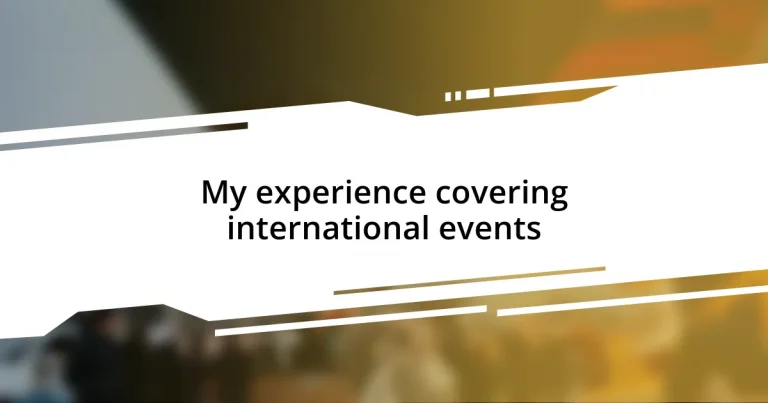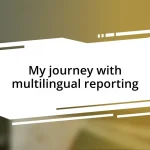Key takeaways:
- International events create opportunities for cultural exchange and personal growth, enhancing empathy and understanding across diverse backgrounds.
- Proficient coverage skills, including cultural sensitivity and storytelling, are crucial for effectively capturing and conveying the essence of events.
- Preparation involves both logistical planning and emotional readiness to engage authentically with local cultures and audiences.
- Challenges such as language barriers and unpredictability can lead to unexpected insights and deeper narratives in reporting.
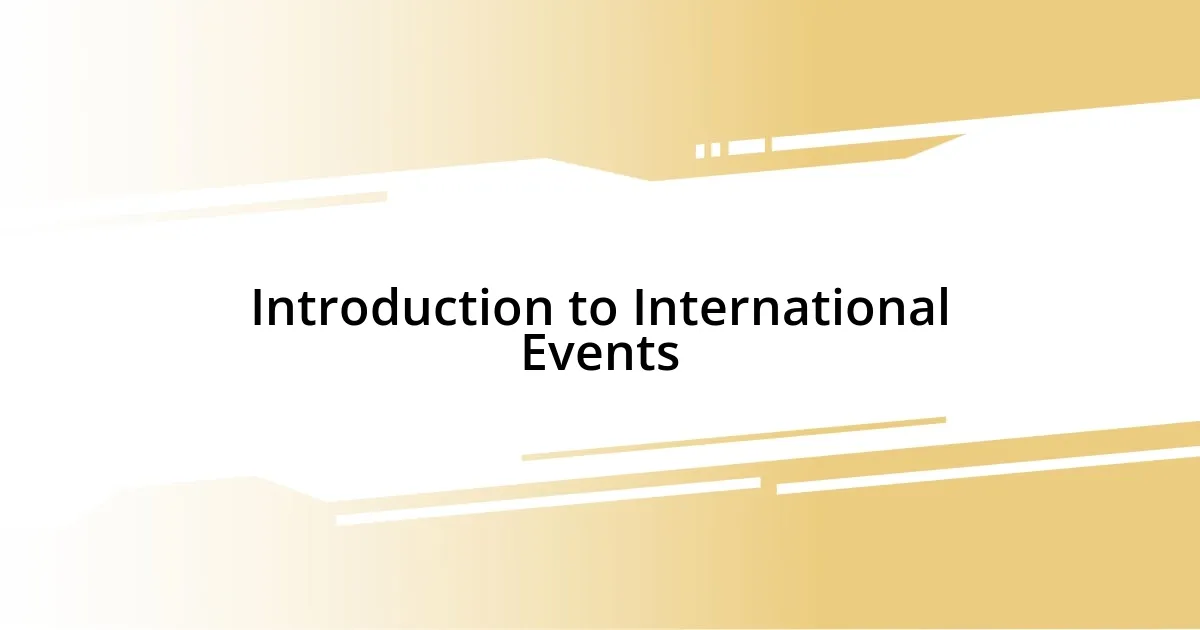
Introduction to International Events
International events have a unique charm that draws people from all walks of life. I remember my first experience attending an international festival; the sense of unity in diversity struck me deeply as I mingled with individuals from different cultures, exchanging stories and ideas. Isn’t it fascinating how a shared passion, like art or music, can bridge gaps across the globe?
As I navigated through vibrant stalls, sampling exotic foods, I couldn’t help but reflect on how these gatherings transform cities into melting pots of culture. The energy was palpable, and every conversation sparked a new insight. Have you ever considered how such experiences can not only broaden our horizons but also challenge our preconceived notions about the world?
In my view, international events serve as a microcosm of global society. They highlight both our commonalities and our differences, teaching us invaluable lessons about empathy and understanding. Engaging with people from diverse backgrounds has always enriched my life, making every event an unforgettable journey. Have you ever wondered how these experiences shape our perspectives long after the event has ended?
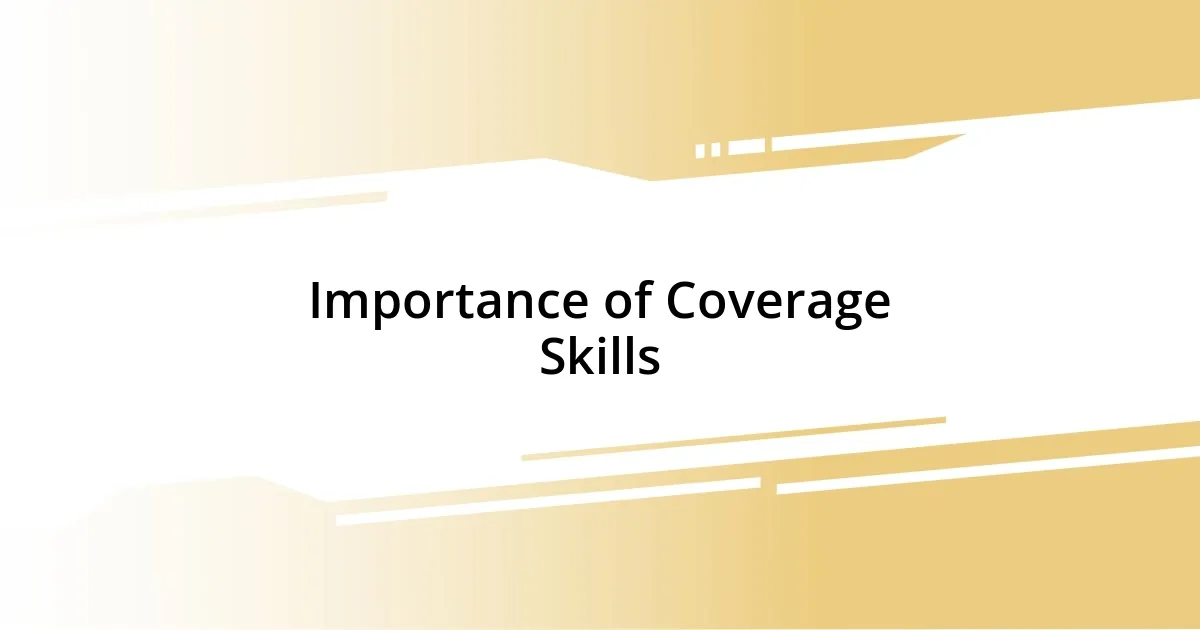
Importance of Coverage Skills
Coverage skills play a pivotal role when it comes to capturing the essence of international events. I recall the time I attended a global summit where I had to quickly adapt my reporting style to different cultural contexts. It’s amazing how being aware of these nuances not only enhances the quality of coverage but also shows respect to the diverse audience consuming the content. Have you ever considered how a single phrase, when said with the wrong intention, can change the entire perception of an event?
Without proficient coverage skills, important details can easily slip through the cracks. At one international conference, I learned the hard way that meticulous note-taking is essential. Missing out on key insights from speakers can lead to misrepresentation; a situation that no journalist ever wants to find themselves in. This taught me that every event has stories waiting to be told, and it’s our job to uncover them.
Think about the role of storytelling in coverage. Effective skills allow us to weave narratives that resonate with readers on an emotional level. I remember crafting a piece on a cultural festival which felt less like reporting and more like sharing a personal journey. By bringing readers along for the ride, they feel connected to the event, and that connection is what truly matters in effective coverage.
| Aspect | Significance |
|---|---|
| Cultural Sensitivity | Enhances respect and understanding in coverage. |
| Attention to Detail | Ensures accurate representation and storytelling. |
| Emotional Engagement | Connects readers with the event on a deeper level. |
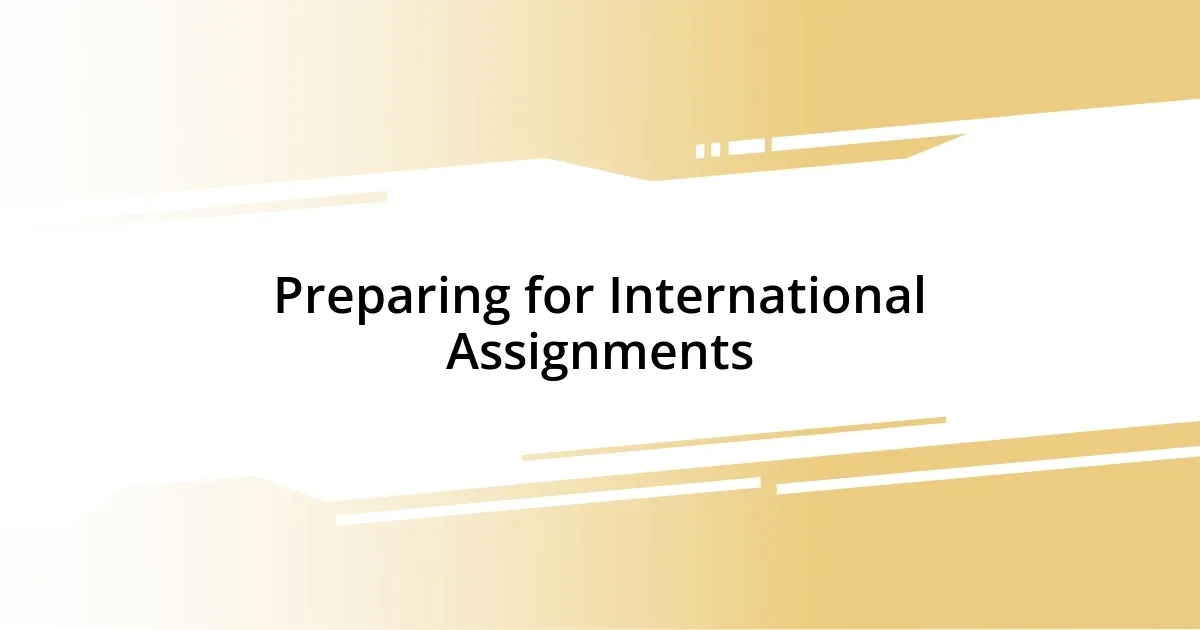
Preparing for International Assignments
Preparing for international assignments demands a blend of practical and emotional readiness. I remember planning for a major arts festival in a foreign country. Packing essentials was easy, but preparing mentally wasn’t. It required immersing myself in the local culture, understanding the expectations of the audience, and considering how I could genuinely connect with the people.
Consider these essential preparation tips:
- Research the Culture: Dive into the local customs, traditions, and etiquette to avoid potential faux pas.
- Set Up a Communication Plan: Having reliable means to stay connected with both the event team and my home base helps manage expectations and smooth out any bumps.
- Create a Flexible Itinerary: While it’s crucial to have a plan, remaining adaptable allows for spontaneous stories and connections that often arise at such events.
As I’ve learned, balancing logistical planning with an open heart not only enhances your experience but also enriches the stories you bring home. There’s something truly amazing about approaching an assignment with both readiness and a willingness to discover the unexpected.

Tools for Effective Coverage
Effective coverage of international events hinges heavily on the right tools. For instance, I always carry a quality voice recorder. On one occasion at a global conference, this little gadget saved me from missing a crucial quote from a prominent speaker. Isn’t it fascinating how technology can seem so simple yet make such a profound impact?
I’ve also learned the value of having multiple platforms for sharing content. During a cultural exchange event, I live-tweeted updates while drafting a blog post. This dual approach not only allowed me to capture the immediate buzz but also to provide a reflective piece later on. It’s incredible how engaging with audiences in real-time can deepen their connection to the story.
Lastly, visual tools can’t be overlooked. I remember attending a food festival and utilizing my smartphone to capture vibrant images of the dishes. When I shared those snapshots alongside my written piece, the feedback was overwhelming. People want to feel as if they are experiencing the event alongside you, and visuals are a powerful way to bridge that gap, don’t you think?
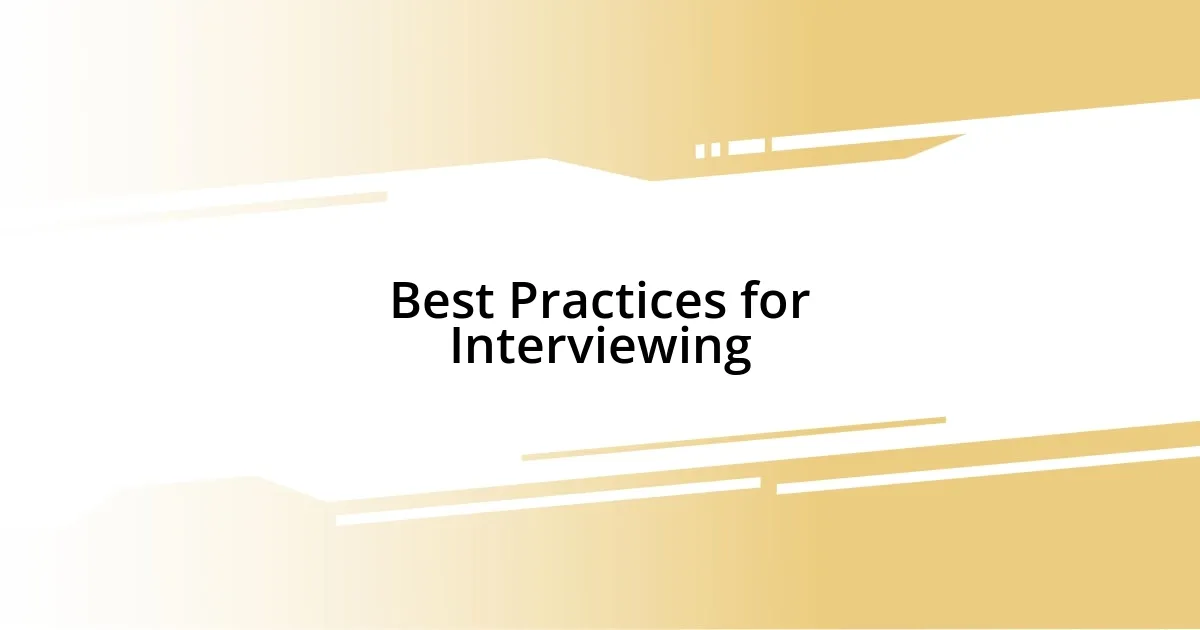
Best Practices for Interviewing
When it comes to interviewing, preparation is key. I’ve found that crafting thoughtful questions ahead of time can make a world of difference. For instance, during a cultural festival, I spent an afternoon brainstorming questions that would not only elicit detailed responses but also spark genuine conversation. Have you ever noticed how a well-rounded question can transform an interview into a memorable exchange?
Active listening is another crucial aspect of effective interviewing. I vividly remember a moment when I was interviewing a local artisan at an international fair—her passion and stories flourished simply because I dedicated my full attention to her words. I tried to maintain eye contact and picked up on her subtle cues. The result? An authentic dialogue emerged, revealing insights I could never have captured with a standard Q&A approach. Have you ever felt the warmth of someone sharing their story? It’s remarkable how building rapport can elevate the quality of your content.
Finally, creating a comfortable environment for your interviewee is essential. I’ve often arranged interviews at casual spots—like a cozy café—or even on-site during an event. For example, while covering a street arts festival, I found that conducting interviews amid the lively atmosphere not only eased nerves but also infused the conversation with energy. How many times have you seen interviews that felt stiff or forced? Letting the surroundings influence the tone can lead to more engaging, spontaneous discussions.
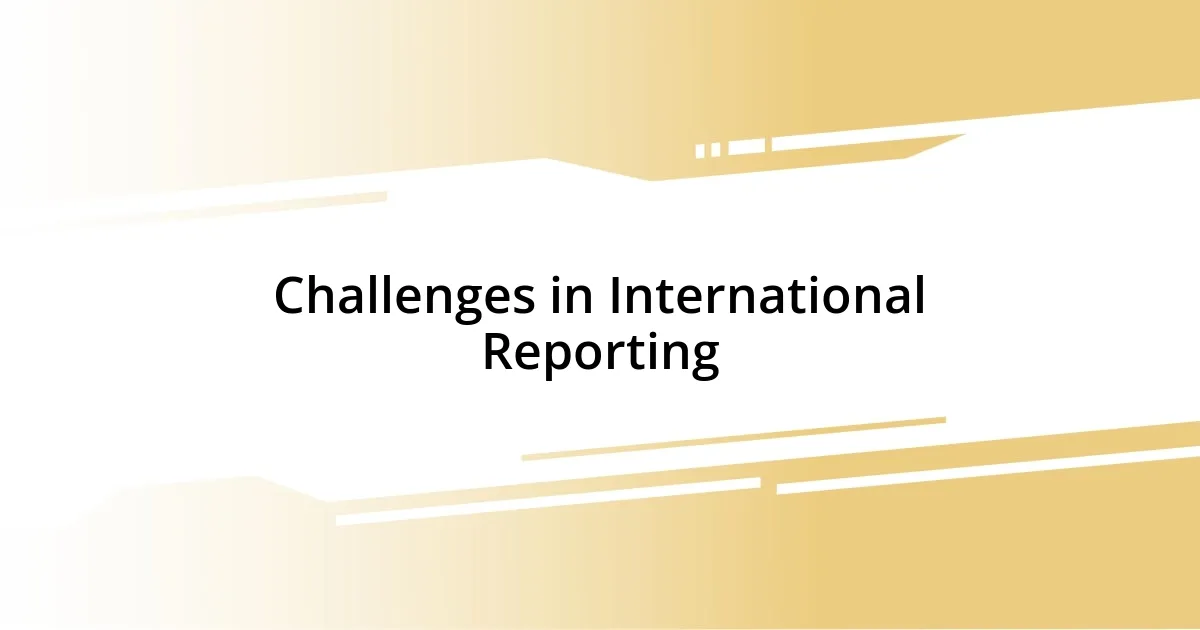
Challenges in International Reporting
Navigating international reporting can be fraught with challenges, particularly when it comes to language barriers. I vividly recall my experience at a media event in a non-English-speaking country, where I needed an interpreter to communicate effectively. It was exhilarating to hear the nuances of different cultures, but frustration set in when subtle meanings slipped through the cracks. Have you ever tried to convey an idea through translations? It can be like trying to catch smoke with your bare hands.
Time zone differences also present a unique hurdle. During a major global summit, I struggled to manage my sleep schedule, trying to balance real-time coverage with the need for proper rest. I can tell you firsthand that nothing saps your creativity faster than sleep deprivation. It’s as if your brain hits a wall, and all those vibrant stories you had in mind fade away. How do you keep your enthusiasm alive when your body is begging for a break?
Finally, the unpredictability of international events can be daunting. Just last year, while covering a sports festival, a sudden weather change thwarted our carefully planned activities. The atmosphere turned chaotic, and I had to think on my feet, finding creative ways to pivot my coverage. Do you ever find that some of your best stories emerge from unexpected situations? I certainly do—it’s as if these challenges breathe new life into the narrative, turning obstacles into opportunities for deeper engagement.
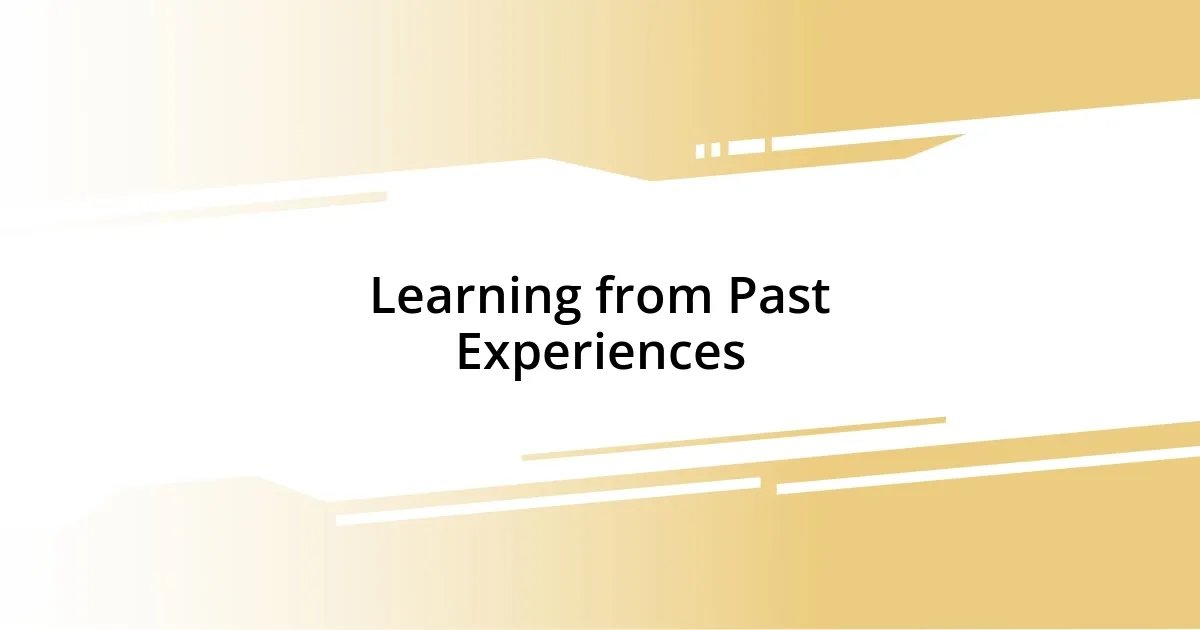
Learning from Past Experiences
Learning from past experiences is an essential part of growing as a professional, especially in the fast-paced world of international events. I still remember a less-than-ideal press conference I attended where technical difficulties led to a complete communication breakdown. Rather than being frustrated, I turned that experience into a lesson: always have backup plans. Now, I carry portable recording devices and have a few fallback questions ready, just in case. Have you ever had a moment that turned into an unexpected learning opportunity?
Another experience that stands out to me is from a cultural exchange festival where I stumbled during a panel discussion. I misinterpreted a question and provided an answer that missed the mark. It was humbling, to say the least, but I realized how vital understanding the cultural context is in such settings. I figured out that reflecting on my blunders allowed me to engage with others more thoughtfully moving forward. Doesn’t it feel empowering to learn from your mistakes?
These moments may feel daunting at the time, but they pave the way for growth. Learning to adapt my interviewing techniques and communication strategies has not only enriched my reporting but also deepened my appreciation for the vibrant tapestry of cultures I encounter. I often think about the importance of adaptability. How can we ensure we’re ready for whatever an event throws our way? Through conscious reflection and embracing our past interactions, I believe we can find the answers.












